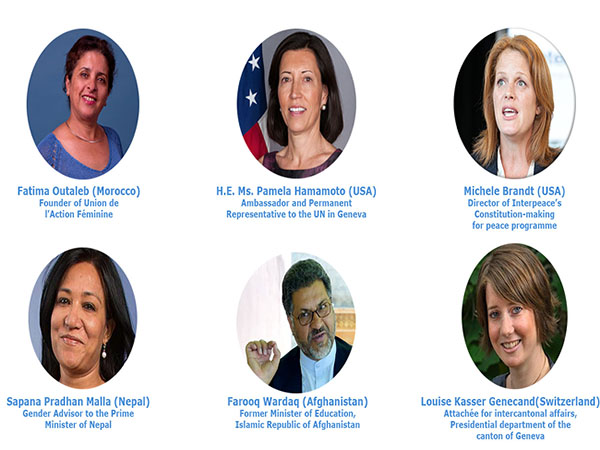Women's Constitutional Voices event: Engaging women in constitution-making processes

Interpeace and the Permanent Mission of the United States to UN in Geneva are co-organizing a panel, “More inclusive ways to peace: the role of women in constitution-making processes”. The event will be held on Thursday 12 November, at 9.30am at the Musée international de la Croix-Rouge et du Croissant-Rouge.
Featuring speakers from different regions and generations who have played key roles in ensuring a better role for women in political processes, including constitution-making, the discussion will center on the need for women's full and equal participation at every level of the constitution-making process. The event will also showcase the important role that women are already playing in these processes.
Speakers at the event will share their personal experiences of the struggle to achieve gender justice in the constitution-making process, setting this in an international but also local context.
This panel is part of Interpeace’s Women’s Constitutional Voices programme that seeks to increase women’s inclusion in the peacebuilding and constitution-making process.
More Inclusive Ways to Peace: The Role of Women in Constitution-Making Processes
12 November 2015 - 9h30 - 11h30
Musée international de la Croix-Rouge et du Croissant-Rouge
Espace Henry Dunant
To register, please click here.
Event speakers
Fatima Outaleb is a founding member and executive board member of Union de l’Action Féminine (Union of Women’s Action) Morocco. The organisation has been part of the women’s lobby to implement the gender parity provision in Morocco’s constitution. As a human rights and gender advocate she has focused on women’s empowerment and gender justice across the Middle East and North Africa (MENA). Fatima also runs a shelter organised by Union de L’Action that helps women victimized by domestic violence, rape and other abuse.
Michele Brandt currently directs Interpeace’s Constitution-making for Peace Programme and its newest project -- Women’s Constitutional Voices. For over twenty years she has implemented constitutional and gender justice programmes including in post-conflict countries. Previously she has worked as a constitutional advisor to UNAMA and Constitutional bodies in Afghanistan. In East Timor she was gender and judicial officer with UNTAET as well as an advisor to the Constituent Assembly. In Cambodia, she co-founded a Women’s Crisis Center and led a legal aid association. Michele has written numerous articles and guidance tools on constitution-making and gender justice – including the Interpeace handbook on constitution-making.
Louise Kasser Genecand became the youngest member of the constituent assembly in Geneva at the age of 23. Serving from 2008 to 2012, she oversaw the organisation and development of the assembly. Previously, she worked as an advocate for youth engagement and the right of foreigners to vote, in Geneva as well as the federal level. She is now an attachée for intercantonal affairs at the presidential department of the canton of Geneva.
Farooq Wardak, in 2002, served as Director of the Constitutional Commission Secretariat as well as the Secretariat of the Constitutional Loya Jirga, the grand Assembly that ratified the constitution. In this role, he supported efforts to ensure women's participation and representation at every stage and level of the process. In 2004, he was appointed as Director of the Joint Election Management Body’s Secretariat (a UN and Afghan Government body) and organized the voter registration process and presidential election. He has also served as State Minister for Parliamentary Affairs and Director General of the Administration as well as Minister of Education.
Sapana Pradhan Malla is an advocate for women’s participation in political and public policy processes. She is a founder of the Forum for Women, Law and Development (FWLD) and a cabinet-appointed Gender Advisor to the Prime Minister of Nepal. While a member of the country’s 1st Constituent Assembly tasked with writing a new constitution, she worked to ensure the inclusion of a comprehensive women’s rights agenda. In 2008, Sapana was awarded the prestigious Gruber International Women's Rights Award and the Asia Foundation’s Lotus Leadership Award in 2013 for her contributions to advancing women’s rights in the developing world.
Also appearing at the event
Ambassador Pamela Hamamoto
In May 2014, Pamela Hamamoto became the second woman to serve as Permanent Representative of the United States to the United Nations and Other International Organizations in Geneva. During her term in office she has sought to use Geneva’s unique position as a center for global humanitarian organizations to create new opportunities for women and girls. As part of this goal the US mission launched The Future She Deserves in 2015, an initiative to promote collaboration between Geneva based organizations on gender issues.
Renée Larivière will moderate the event. She currently heads the Development and Learning division of Interpeace. Her main responsibilities are focused on providing the vision and leadership for Programme Development, Learning and Policy and IPAT. She also supports the development of the Constitution Making for Peace Programme. Operating in the complex environments of fragile societies, she has extensive experience in working closely with the different stakeholders that have an interest in building sustainable peace. Renée came to Interpeace in 2007. Prior to this she worked in Peru on issues around the access, use and management of natural resources. Renée also worked in Pakistan with LEAD International and at the Canadian International Development Agency (CIDA).
